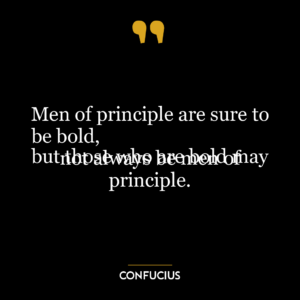I transmit but do not create. I place my trust in the teachings of antiquity.
“I transmit but do not create. I place my trust in the teachings of antiquity,” is a statement that emphasizes the value of the wisdom that has been passed down through generations, rather than the pursuit of new knowledge for its own sake. It suggests the importance of learning from the past, understanding and respecting the knowledge that has been accumulated over centuries, and then transmitting this knowledge to others.
The first part, “I transmit but do not create,” can be interpreted as an acknowledgement of the role of a teacher or a mentor as a conduit of wisdom and knowledge, rather than the original source. This does not diminish the role of the teacher, but rather emphasizes the value of the knowledge being passed on. It’s a humbling statement that acknowledges the wisdom of those who came before us.
The second part, “I place my trust in the teachings of antiquity,” suggests a deep respect and trust in the wisdom of the past. It implies that there is much to learn from the teachings of our ancestors, and that these teachings have stood the test of time for a reason. This is not to say that all old teachings are correct or that new ideas should be dismissed, but rather that there is inherent value in the wisdom of the past.
In today’s fast-paced world, where new information and ideas are constantly being generated, this quote could serve as a reminder to slow down and reflect on the wisdom of the past. It suggests that while innovation and creativity are important, they should be balanced with respect for the wisdom and knowledge that has been passed down through generations.
In terms of personal development, this quote might inspire us to seek out mentors and teachers who can pass on their wisdom to us. It might also encourage us to read and learn about the teachings of the past, and to reflect on how these teachings can be applied to our own lives. It’s a reminder that personal growth and development often involve learning from others and from the past, rather than constantly seeking out new ideas and experiences.









